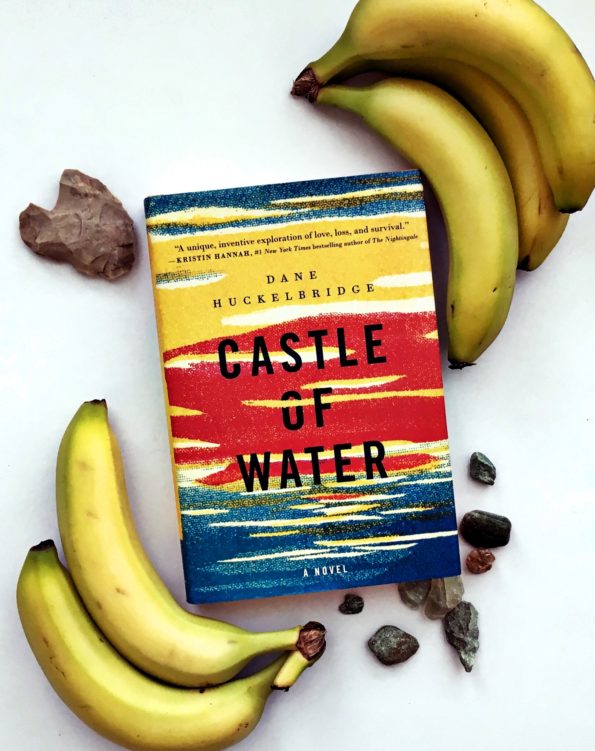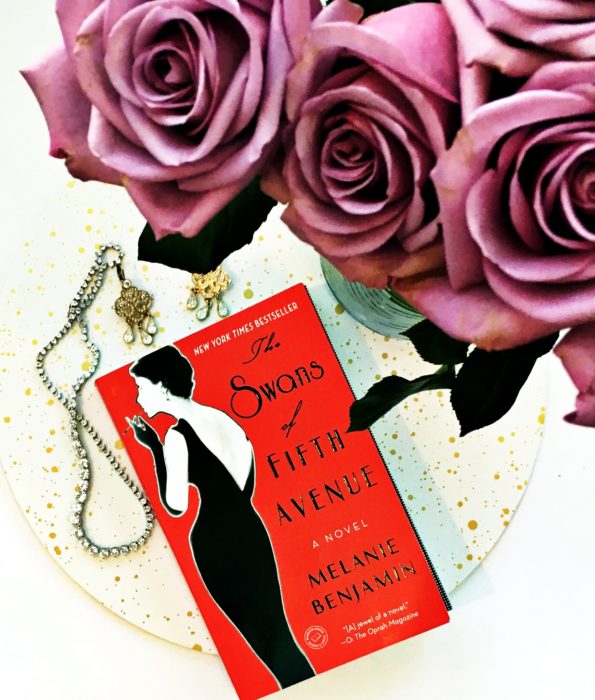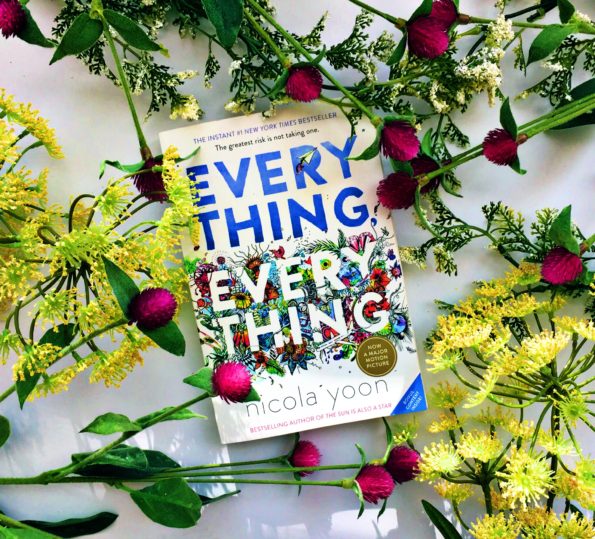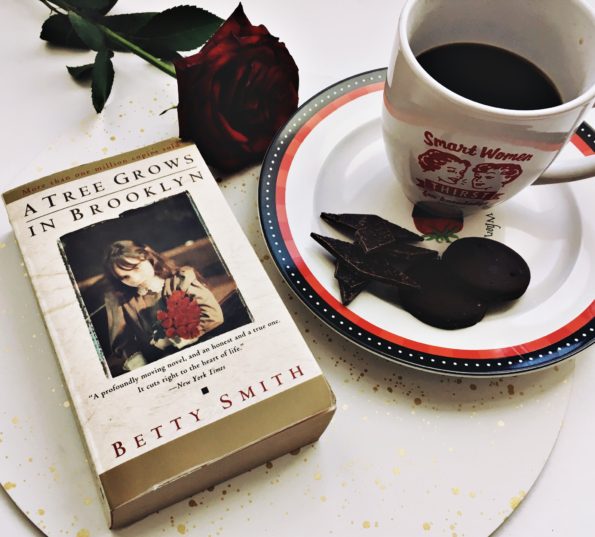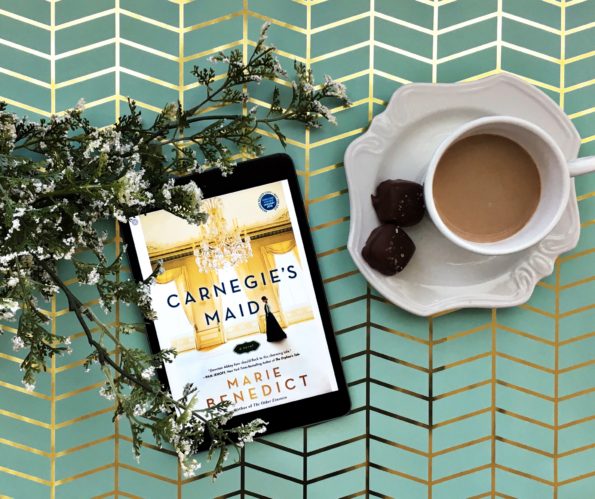Review: Castle of Water
I usually start my reviews with a quote from the book. I couldn’t this time, for two reasons. One, I read the book so voraciously that I hardly took any notes because I didn’t want to stop reading. Two, I would really like to quote the entire book. It is that good.
Castle of Water by Dane Huckelbridge was our March selection for the Bucket List Book Club, and I’m so glad it was. This has been sitting on my nightstand since last year when Madeleine at Top Shelf Text implored everyone to read it. I wish I had listened sooner. This is one of the best, funniest, and most heartbreaking novels I’ve ever read, and you’d better believe I will be first on the pre-order list for whatever his next book is.
Barry, a New Yorker who has just quite his job in finance, and Sophie, a French architect on her honeymoon, are both on the same tiny plane to visit the small island of Hiva-Oa in the Marquesas, for very different reasons. When the plane crashes and everyone, including Sophie’s new husband, except Sophie and Barry perishes, the two survivors must find a way to live together on a small deserted island. They have to not only survive the island, but each other. Stranded on an island with very little hope of rescue, Barry and Sophie must learn to trust each other in order to persevere and survive the island, and everything it throws at them.
Huckelbridge has an almost journalistic style of storytelling, and I had to keep reminding myself that I was reading fiction. He manages to put two characters into an almost unbelievable situation and make all of it very believable. I really knew Barry and Sophie, and understood why they made certain choices. (Even if I didn’t always agree with them.) Watching them get to know each other, and to see who they really are at the core, was an amazing experience. The level of detail included in the story was absolutely wonderful. I won’t give it all away, but one detail that Huckelbridge included throughout was Barry’s contacts, one of the few things to survive the crash. Here he is, on an island, with nothing, but he still has his routine of putting his contacts in in the morning and taking them out at night. It was so interesting to see what normal routines were included in the story, and how they would play out in this situation. The author is also just plain funny, and I laughed out loud several times throughout the novel. (Except for the last ten pages, which I won’t talk about, but you’ll understand once you read it.)
I don’t want to give any spoilers, but I will say that romance is definitely not at the heart of this novel, and I really appreciated that. It would have been so easy to have them be romantically involved early on, but the author portrayed them accurately-they really aren’t huge fans of each other at the beginning, and they have to work around that. It made the book more interesting, more honest, and more heartfelt in the end. (In which my heart was ripped out.) This is no Gilligan’s Island with a bar, tikki huts, and romance around every palm tree. This is about real people, and how they would really act.
Dane Huckelbridge has said that his intention for this book was to write “literary fiction that’s actually enjoyable to read.” Castle of Water more than accomplishes this. This is definitely literary fiction, but it’s not highbrow, or fancy, or unrelatable to certain groups of people. It’s an extremely well-written book with characters you root for and care about, and I cannot recommend it enough to everyone who loves a good story.
⭐⭐⭐⭐
Review: The Swans of Fifth Avenue
This, this moment, was real, but more precious, more golden, than any fairy tale.
My mom saw Truman Capote once. She lived in New Jersey at the time and had gone into NYC for dinner. She saw him through the window of the restaurant she was eating in, walking past in his signature white suit and white hat. There was no doubt it was him. He was glam, mysterious, and popular, and always surrounded by scandal. In Melanie Benjamin’s The Swans of Fifth Avenue, we get to read a fictionalized re-telling of Capote’s golden years. The 1950s, NYC, surrounded by his socialite friends, his swans. It’s an interesting story, with a sad undercurrent, and it made me want to read more about all the real life characters in the book.
Truman Capote and Babe Paley (a popular, perfect socialite married to CBS founder William Paley) were best friends, and saw each other more as family. Babe was at the top of the social food chain in 1950s New York City, and she brought Truman along with her. Her upper-crust friends, dazzled by the gossipy, famous Truman, trusted him with their more scandalous secrets. When he started his fall from grace after publishing his self-proclaimed masterpiece In Cold Blood, he decides to use his friends’ stories as the basis for a new book. The fallout from that decision is, in some cases, truly life-ending.
This was my first Melanie Benjamin book, and I definitely want to read more. She does historical fiction so well, and I love being entertained while I’m learning something about an interesting time in history. I don’t know a lot about Capote’s history, but I want to know everything about it now! This is like a crash course in this particular society and time; after every chapter I found myself saying, “Did that really happen?” And then Googling the event to find out the entire backstory. (Which is why it took me longer than usual to finish this book!)
While this book is reminiscent of a fairy tale, it’s more like a Brothers Grimm fairy tale, with dark secrets and broken trust throughout. Capote’s world of socialite swans was gossipy and glittering, but at its heart is a sad story. Given Truman’s background and personality, he should never have been able to fit in with that high society group in NYC. He was built to be an outcast, and he absolutely knew it. He also knew enough to take advantage of every opportunity. Babe Paley, beautiful, popular, and Truman’s darling, was unhappy in her platinum cage, and tried to seek happiness in her friendship with Capote.
The Swans of Fifth Avenue is a wonderful, fictionalized telling of the scandalous and extra juicy evens surrounding Truman Capote’s rise in his socialite swan pond and his subsequent crash down to the ground. If you like historical fiction and good stories, I definitely recommend this one!
⭐⭐⭐.5
EXTRA!
The author’s website has great resources if you want to read more about the real people who inspired this book!
Following in the Footsteps of the Swans
[Top]Review: Everything, Everything
Life is a gift. Don’t forget to live it.
We all feel isolated at times. Like no one really understands what we’re going through and that there’s no one to talk to. In Everything, Everything by Nicola Yoon, that isolation is explored in detail through a teenager with a devastating disease, her protective mom, and a nurse who just wants to see her patient happy. This YA novel is beautifully written, an interesting concept, and really nails that teen angst without getting TOO angsty. (I realize that I’m the last person on the planet to read this book, but I’m glad that I did! Movie is up next!)
Madeline has lived her life in a white room in a white house with her physician mother for almost her entire life. Her only contact is with her nurse, Carla, and whatever she can see outside her bedroom window. She was diagnosed with SCID (Severe Combined Immunodeficiency) as a young child, which basically means she’s allergic to everything. Her house is airtight, she can only eat certain foods, books are delivered brand new and plastic wrapped, she is homeschooled, and she can’t have any contact with anyone in the outside world. Enter Olly, her new next door neighbor, a boy who runs up walls, wears all black, and isn’t intimidated by Maddy’s condition. From the moment they see each other, a connection forms, and he will either save her life or be the downfall of it. Maddy has to decide whether she wants to play it safe and keep her health intact, or take a risk to be with the boy she loves.
This is a very solid YA novel, and I think anyone can relate to the feelings that Maddy has about wanting to take risks in order to live her life to the fullest. She loves her mom and Carla, and wants to do what she’s supposed to do, but she also wants to experience all the things that life has to offer. If you can’t fall in love and be with that person, are you really living?
The writing is wonderful, but I did find the plot a bit predictable, including the big twist. (And it is a great twist!) There were a few plot holes that bugged me as well, but overall I’m glad that I read it. I am extremely glad that Maddy is a diverse character (half Japanese, half African American) that teens everywhere can identify with. I really loved Maddy herself. She’s sweet and smart and strong and a thinker-what more could you want in a lead character?
All in all, Everything, Everything is a beautiful book, and Nicola Yoon is an extremely talented writer. If you enjoy reading about the human spirit and what people will do when placed in impossible situations, I think you’ll like this one. It’s a quick read, and will definitely make you think!
⭐⭐⭐
[Top]Review: A Tree Grows in Brooklyn
The secret lies in the reading and the writing. You are able to read. Every day you must read one page from some good book to your child. Every day this must be until the child learns to read. Then she must read every day, I know this is the secret.
A Tree Grows in Brooklyn by Betty Smith has been sitting on my bookshelf for over 20 years. Growing up, my best friend implored me to read the book for years, and she is the one who gave me the copy I’ve had since high school. This is why it was high on my list for The Unread Shelf Project, and my first choice for the Bucket List Book Club. My first thoughts on this book were, “I cannot believe I waited so long to read it!” A Tree Grows in Brooklyn is so wonderful. Yes, it’s a classic, and yes, it is long, which can be a deterrent for me. But this isn’t like any other classic I’ve read. It’s beautiful and timely and fun to read, and the second I finished it I flipped back to the first page and read some of it again. If you joined in with the Bucket List Book Club’s reading of this, or have already read it, please comment below or on my Instagram page with your thoughts about this book! (We will be having a group discussion over on Instagram on Sunday, March 4, at around 2PM CST.)
“You won’t die, Francie. You were born to lick this rotten life.”
Francie Nolan and her family (mom, dad, and little brother) live in the slums of Brooklyn. Williamsburg, to be exact. This book is divided into 5 books, each one focusing on a different time period in Francie’s and her parents’ lives. The book is largely about Francie’s formative years in Brooklyn and her goal of getting out of the slums, but the other characters are fully formed, and we get an entire picture of how her family came to be, how and why Francie is the way she is, and how people of all kinds survived poverty in the early 1900s in New York.
There is too much in the book for me to summarize the plot here, and I don’t want to give anything away. But as my friend implored me years ago, I implore you to read this book! It is loosely based on Betty Smith’s life, and how she gained an education without the means to do so. Smith’s descriptions in this book are flawless. They are not overly flowery or long, but I wasn’t just reading about Francie’s apartment, I was there, eating bread paste meals with her, buying penny pickles on days where there was no food, and surviving the seasons. The depiction of how Francie and her brother Neeley had to get food were particularly stunning: the lengths to which poor families (the book’s verbiage, not mine) had to go to to just get scraps of food is unreal. (And still relevant today, shockingly enough.)
A Tree Grows in Brooklyn is funny, emotional, sentimental, eye-opening, charming, and absolutely inspiring. Francie is a kindred spirit who loves books, libraries, chocolate, and learning. There are some passages that are a bit cringe-worthy, a sign of the times in which the book was written, some are shocking for the time, but on a larger scale, this book is still very relevant today. It truly will make you laugh, cry, think, and reconsider everything you know about how we live, how we survive, and how we can change our situations with determination and hard work. Bottom line: READ THIS BOOK!
⭐⭐⭐⭐⭐
EXTRA!
Francie is a book nerd like the rest of us, and I love her for it. The moment she discovers that she can and wants to become a writer was a magical moment for me in the book. She is all of us who grew up embellishing the truth to make it sound better and discovering that that kind of lying is actually encouraged in writing. She reminds me of Anne Shirley quite a bit, and I think the two books would be wonderful companion reads.
Review: Carnegie’s Maid
Thank you to Netgalley and Sourcebooks for the review copy of this book! All opinions are my own!
All around me, I heard cries of reunion as my fellow passengers fell into the arms of their waiting relatives. But I walked on. No one was waiting for me.
Marie Benedict has quickly become one of my favorite authors over the last year. Which is great, but also a problem because she’s only written two books and I want more! I read her first book, The Other Einstein, in June as part of the Big Library Read. It was a fictional re-telling of Albert Einstein’s first wife, Mileva Maric, and the impact she had on his work and life. (And the credit she never received.) I loved it (You can check out my review of that book HERE.), so I was very excited when I found out her second book, Carnegie’s Maid
, would be published in January. Readers, it did not disappoint. I loved it just as much as her first book, and I definitely recommend this historical fiction novel.
Clara Kelley has come to America on a ship from Ireland to make her way in the land of opportunity-her family needs money and jobs are scarce in 1860s Ireland. The boat ride over is rough-sickness, not enough food, not enough space, and many people didn’t survive the trip. When she hears someone calling her name (a very common Irish name) to get on a carriage to Pittsburg, Clara jumps at the chance. The only problem is that she isn’t the Clara Kelley the driver was waiting for-that Clara most likely never made it all the way to America. In Pittsburgh, she becomes a lady’s maid to Andrew Carnegie’s mother, a notoriously difficult woman. As she gets to know the family more, and very much fakes it until she makes it in an unknown environment, she develops a close relationship with Andrew. He teaches her about business, and she helps him with his business. The Civil War is in the background and while not a focus, it provides some interesting side stories. But when her identity is revealed, she has to make a decision whether to stay or go, and to fight for what is right for her own life.
Clara is a completely fictional character, but represents the countless number of immigrants who could have influenced the upper classes as America was still being formed. Benedict was inspired to begin research for this novel when she came across Carnegie’s letter to himself pledging to use his wealth to help less privileged citizens gain success through knowledge. She imagined why he would have written that, and Clara was born. As with Einstein, this book made me want to research the history behind it. This is a particularly interesting story because Carnegie, one of the wealthiest people in American history, came to American as a poor Scottish immigrant. He had drive, but he also had help along the way, and the dichotomy between him and Clara is extremely interesting. He recognizes that Clara is in the same position he was when he first came to American, and he wants to help her, but he also wants to be sure to maintain his status.
Clara might be a fictional character, but strong women in history are not, and there are so many stories that we will never know because of men taking the credit. Carnegie’s Maid is Benedict’s excellent attempt at giving a voice to some of those strong female influencers throughout history, especially during a time when the infrastructure of the United States was newly forming. And to be very plain, it was just a really good story that sucked me in within the first few chapters. Benedict writes fully formed, interesting characters, and I truly hope she continues writing these books and giving a voice to women in history, fictional or not.
⭐️⭐️⭐️⭐️
[Top]
